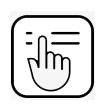
Children with ODD may exhibit aggressive or defiant behavior towards parents, educators, and others in authority. ODD therapy provides a safe environment for kids to work through their emotions healthily and address symptoms of ODD, which include:
Anger or Irritability
Argumentative & defiant behavior
Vindictiveness
Habit of questioning
Blame others for mistakes

Attention deficit hyperactivity disorder (ADHD)
Attention deficit hyperactivity disorder (ADHD) is a common childhood developmental disorder that can cause difficulty with executive functions: memory, attention, and self-regulation. When ADHD exists alongside ODD, the following symptoms can occur:

Conduct disorder
Conduct disorder is similar to ODD, except it involves widespread behavioral and emotional problems coupled with a disregard for others, not limited to authority figures. Children who struggle with conduct disorder may appear confident, threatening, or even aggressive, but these behaviors actually stem from feeling insecure, experiencing past traumas, and rely on learned behavior.

Depression
Major depressive disorder can influence children, where it may manifest as low mood, sadness, and loss of interest in previously enjoyed activities. Depression can often highten the symptoms of ODD, and ODD can in turn make Depression worse. Therefore, seeing a licensed child therapist is important if your child experiences the following symptoms:

Autism Spectrum Disorders
Autism Spectrum Disorders (ASD) is a childhood developmental disorder characterized by differences in the brain, often resulting in difficulty in social situations and restricted or repetitive behaviors or interests. Children with ASD have different ways of learning, moving, socializing, and doing that are not inherently bad, but oftentimes different. For reasons unknown, ASD has high comorbidity with ODD. Symptoms include:

Disruptive mood dysregulation disorder
Disruptive Mood Dysregulation Disorder (DMDD) is a psychiatric condition primarily diagnosed in children. It manifests as observable mood disruptions characterized by frequent anger and irritability. Key distinguishing signs of DMDD from other psychiatric conditions include:

Antisocial personality disorder
Those diagnosed with antisocial personality disorder (ASPD) experience a mental health condition characterized by consistent patterns of manipulation and disregard for others. Onset typically occurs in childhood or early adolescence and persists into adulthood. Common traits observed in individuals with ASPD include:
Our therapists specializing in Oppositional Defiant Disorder (ODD) strive to create a nurturing, supportive, and consistent environment for your child, helping them manage symptoms and minimize episodes of defiant behavior.


855-722-4422

By loving them for more than their abilities, we show our children that they are much more than the sum of their accomplishments.

Eileen Kennedy-Moore
Through therapy, children and adolescents can learn to manage the behavioral symptoms of ODD. Our therapists for children support them in acquiring better coping mechanisms, social skills, and problem-solving strategies to express and regulate their anger.

Find Your Therapists

Check Your Insurance

Schedule Your Session

Treatment for oppositional defiant disorder can empower individuals to cultivate fulfilling relationships, foster positive interactions with peers, and thrive academically and professionally. Our ODD therapists work with you to comprehend ODD and effectively navigate feelings of defiance and opposition.
Through online ODD therapy, you can initiate transformative changes and support your child's journey towards greater success right from the comfort of your home. Our therapists establish a positive rapport with your child, offering positive reinforcement and meaningful engagement to address and overcome ODD challenges.
Find Your Specialists Nearby
Our Therapists | Insurance Coverage | Services Offered | Privacy
At Lifebulb, we are extremely selective about the therapists we hire because we know choosing the right therapist can make all the difference in our clients reaching their ODD therapy treatment goals. Our therapists are all educated at the masters level and above and have received several years of hands-on training before becoming fully licensed clinicians. Even among the pool of highly trained therapists, we only work with those who align with our core values. That way, we know your therapist will go the extra mile to help you and offer the best online therapy or in-person counseling.
Oppositional Defiant Disorder (ODD) is defined by a recurrent pattern of defiance, antagonism, and disobedience toward authority figures. Here are four actions that are frequently linked to ODD:
Although all children occasionally exhibit some of these behaviors, a diagnosis of ODD requires that the behavior be persistent and impair the child's ability to function in daily life.
The exact causes of Oppositional Defiant Disorder (ODD) are not fully understood, but there are several factors that are believed to contribute to its development.
They are as follows:
However, other factors such as life stressors or a traumatic event may also play a role in the onset of ODD. By seeking the advice of a qualified therapist and counselor, you can help your child deal with oppositional defiant disorder in the best way possible.
No, Oppositional Defiant Disorder (ODD) is not a form of Attention Deficit Hyperactivity Disorder (ADHD). While both ODD and ADHD share some similar symptoms, they are distinct conditions with different diagnostic criteria and treatment approaches.
It is important for a healthcare professional to conduct a thorough evaluation to determine the appropriate diagnosis and treatment plan for each individual.
Disciplining an ODD child can be challenging, as they may be more resistant to traditional forms of discipline. Strategies such as using positive reinforcement, setting clear boundaries and consequences, choosing which behaviors to address, avoiding power struggles, and seeking professional help are all important when disciplining an ODD child. It is important to remember that each child is unique and what works for one child may not work for another, so it is important to remain patient and flexible when disciplining an ODD child.
There are several types of therapy that may be helpful for children with Oppositional Defiant Disorder (ODD), such as:
At Lifebulb we can help determine the most appropriate therapy for an individual child based on their specific needs and circumstances.
Therapy can be the best treatment for ODD (Oppositional Defiant Disorder), especially when it is tailored to the individual child's needs and circumstances. It can teach children new skills, improve family relationships, reduce symptoms, and prevent other problems. Research suggests that a combination of therapy and medication may be the most effective approach for children with ODD.
Yes. All of our therapists are able to provide best Online Oppositional Defiant Disorder treatment services and Oppositional Defiant Disorder therapy plans to our clients.
We accept many major commercial insurance plans, including Aetna, Amerihealth, Cigna, Optum Health, United Healthcare, Tricare, and others. If you don't see your insurance listed, we would be happy to verify your benefits to see if we can accept them, and if not, we offer you an affordable self-pay rate.
Lifebulb has several locations for in-person ODD disorder treatment and is adding more regularly. We also provide telehealth or online therapy session services for those who may live distant from our offices. You can reach out to Lifebulb using our 24x7 active helpline, or you can search for us online; simply use ‘ODD therapy near me,’ ‘ODD treatment centers near me,’ ‘Oppositional Disorder treatment near me’ or ‘treatment for ODD near me.’
Read our resources on Oppositional Defiant Disorder treatment & related topics that might interest you.